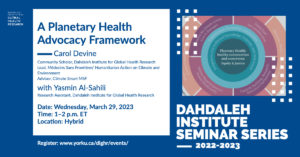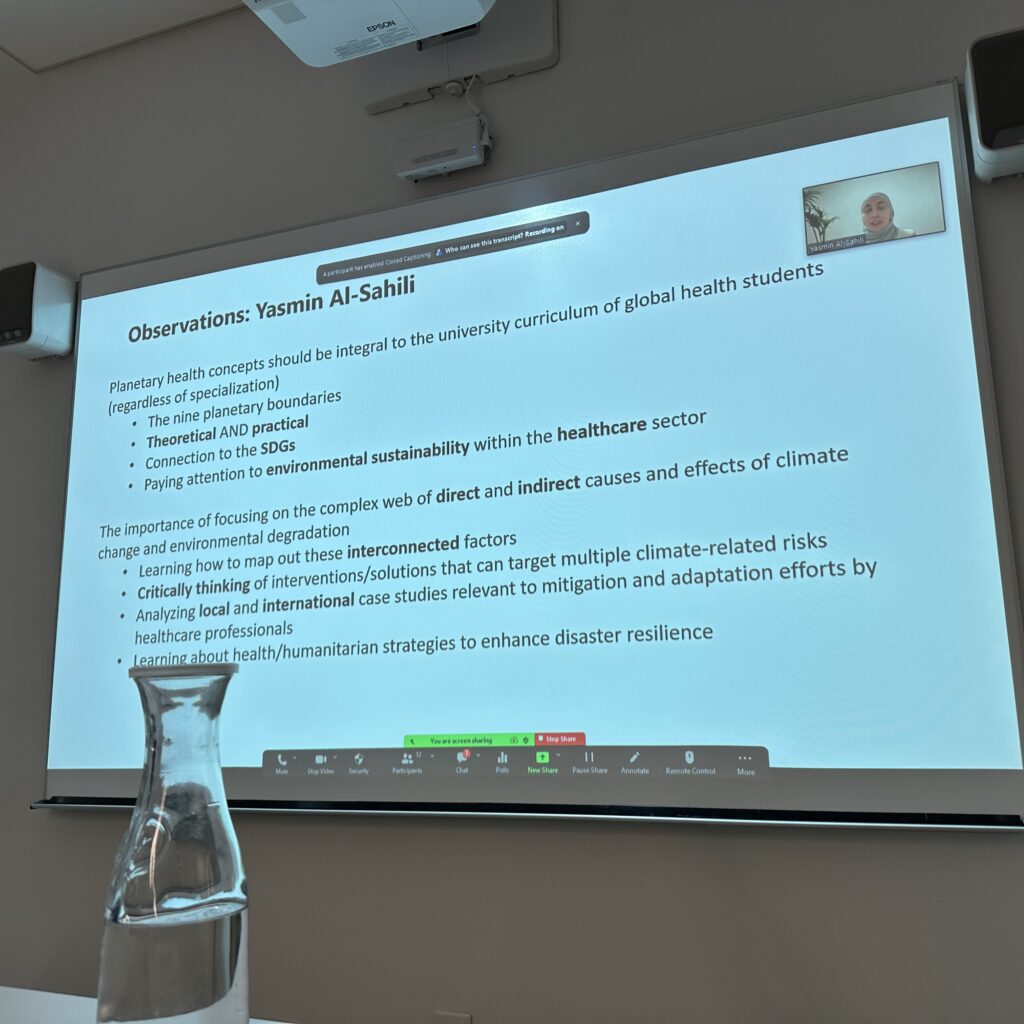Post
Published on April 5, 2023

Written by Liliana Antonshyn and Alyssa Ramos, Research Apprenticeship Programme students at Glendon College, York University (originally published by YU Research, 5 April 2023).
On March 29th, the Dahdaleh Institute for Global Health Research held a collective discussion, led by Carol Devine and Yasmin Al-Sahili. Devine is a Community Scholar at the Dahdaleh Institute working on a framework for Planetary Health Advocacy. Al-Sahili worked on the Planetary Health Advocacy Framework, as a research assistant, with Devine.
The question that animated the group is: how do we build strategies to frame and communicate knowledge about planetary health? The aim is to develop principles that further advocacy in the areas of humanitarianism, global health, planetary health, and climate change.
What began as a framework has evolved, Devine and Al-Sahili emphasize, more into a "tool for advocacy" that explores the impacts of climate change on health. The tool is meant to inform operational programs to mitigate climate change and advocacy for new ways of living that are sustainable for humans and for other life on earth.
As a living tool, it is constantly and sometimes rapidly changing in response to dialogue from a wide range of actors. This dialogue is vital. As Devine paraphrases Indigenous Planetary Health leader Dr. Nicole Redvers, climate change will not be resolved by technical fixes. Instead, “what will solve the climate crisis is language and dialogue”.
While developing the tool, a major question is figuring out how to effectively communicate knowledge to diverse audiences. A circular design with multiple rings, for instance, seeks to show the interconnectivity of different elements. This recalls the relationships between human health and the wellbeing of the natural world, as well as known solutions among and across different actors.
Indigenous peoples and local communities are especially important, Devine emphasized, to biodiversity stewardship and knowing climate change solutions.
Al-Sahili echoes this view. She emphasizes the importance of understanding colonialism and colonial practices in exacerbating climate change-associated health consequences. Those who have been subject to colonialism suffer the most immediate effects of climate change," Al-Sahili observes," but they have contributed the least to global warming. The voices of those with non-western worldviews, and specifically Indigenous knowledges, perspectives, and ways of doing, are critical to decolonizing planetary health tools."
This means recognizing that we live in a pluralistic world, where many different ways of knowing co-exist.
Many Western-trained scientists understand the world in terms of systems and variables. This may be very different from how other communities and cultures make sense of themselves and their environments. Despite the diversity across and within their communities, many Indigenous peoples, for instance, understand the world as embedded in strong, even sacred responsibilities to the lands that have been theirs from time immemorial. Indigenous scientists may bring their Indigenous knowledges to problem-solving as they seek to understand and mitigate climate change.[1]
The framework must respond to competing paradigms. As a living tool, it always has room for change, updates and improvements.
Participants at the seminar had many ideas they contributed to the conversation.
Some suggested that it would be useful to add stories to the tool to illustrate and communicate knowledge to broad audiences. Stories represent us and are central to who we are as human beings. As Professor Orbinski observed, “While we have a lot of science about climate change, we don't have many stories”.
Compelling narratives, as much as or in combination with science, are necessary to help us to understand the challenges that climate change represents.
Others proposed developing a certificate program within the Institute for Global Health Research to share knowledge within academia about the critical importance of planetary health.
In addition, the tool for planetary health needs to be relevant beyond academia. To be meaningful, participants emphasized, the tool has to be understandable for many people. Some participants suggested building a website to make the tool interactive, dynamic and accessible to a wide range of users.
Out of the lively discussion, the relationship between global health and well-being and planetary health was emphasized again and again. We will only become healthy, as communities, when we live in healthy ecologies. That demands that we do what we can to mitigate climate change and prevent more negative impacts, suffering and loss, while simultaneously advocating to secure more ecologically sustainable and equitable futures.
Watch the seminar presentation below:
Connect with Carol Devine and Yasmin Al-Sahili.
Themes | Planetary Health |
Status | Active |
Related Work | |
Updates |
N/A
|
People |
Carol Devine, Community Scholar, Health, Environment & Climate Change - Active
Yasmin Al-Sahili, Global Health Intern [FW21-22] - Alum |
You may also be interested in...
2023 Graduate Research Spotlighted at Annual Dahdaleh Graduate Symposium
The Dahdaleh Institute hosted its 4th Annual Annual Global Health Graduate Scholars Symposium on Wed. December 13, 2023. Joined by 20 attendees, the superb presentation line-up featured research addressing some of the most pressing issues ...Read more about this Post
Congratulations! Jude Kong Selected to Develop Global South Artificial Intelligence for Pandemic and Epidemic Preparedness and Response Network
The five-year project is aimed at ensuring vulnerable and at-risk populations are included in disease outbreak management and policies. At a time when the risk of emerging or re-emerging infectious diseases (ERIDs) is increasing, an ...Read more about this Post
Recap – The Protection Gaps that Venezuelan LGBTQI+ Asylum Seekers Face in Brazil
On October 19, the Dahdaleh Institute for Global Health Research and the Centre for Research in Latin America and the Caribbean co-sponsored a seminar with Yvonne Su (faculty fellow) and Gerson Scheidweiler (postdoctoral fellow). Yvonne and ...Read more about this Post



